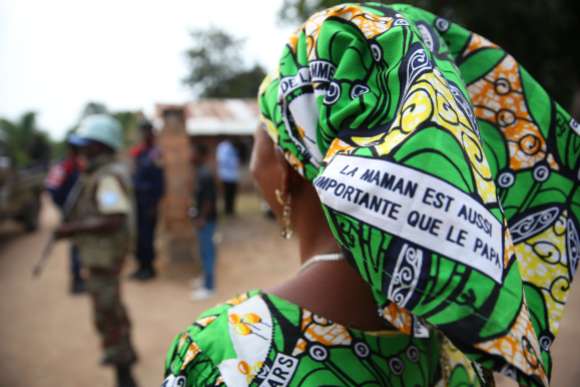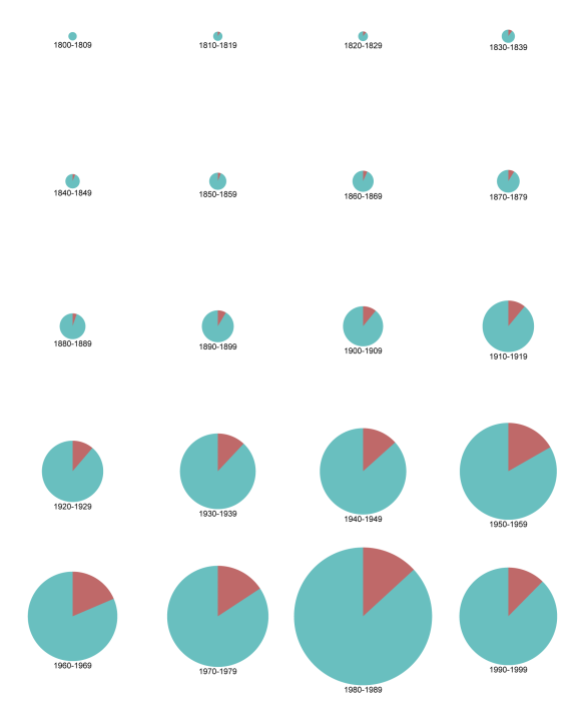
A recent workshop has used Wikidata to demonstrate that a gender gap still exists on Wikipedia: women born in Africa in the 19th and 20th centuries, for example, make up only 15–20% of the total number of biographies. More broadly, systemic bias also plays a factor: the number of articles about people born in Africa is extremely limited when compared to people born in Western countries, like Germany, Switzerland, or Italy.
Wikidata, a central storage place for the structured data of its Wikimedia sister projects, allows expert users to put up queries like those above and generate large data sets. From 6 to 9 February 2017, we held an intensive workshop in Lugano, Switzerland, to figure out ways to generate data visualizations and communicate the knowledge gaps that exist in Wikimedia projects.
The Laboratory of Visual Culture at the University of Applied Sciences and Arts of Southern Switzerland (SUPSI) adopted the experiment in an effort to support the research project Wikipedia Primary School.

The workshop participants explored Wikidata queries and fundamental research questions regarding the typologies and qualities of biographies of notable persons from Africa. The queries have been supported by information about content gaps and Wikidata, provided by Wikipedians Florence Devouard and Jens Ohlig.
We started working on this topic to build on a great example of data visualization about the distribution of biographies of notable people throughout history, created by the Oxford Internet Institute.
The goal was to dig into this topic by manipulating large datasets and by sharing with the community pictures of the gaps existing between Africa and a selection of European countries with the largest populations. In the comparison, Africa nearly disappears. We have validated our hypothesis by finding evidence in the data and by visualizing the gap.
The workshop aimed at testing a method to work with Wikidata. It is a tool that still requires the expertise of proficient users. Moreover, we were concerned with developing a valid format that can be replicated in future workshops addressing the topic of knowledge gaps in Wikimedia projects.
Serena Cangiano
Giovanni Profeta
Marco Lurati
Fabian Frei
Florence Devouard
Iolanda Pensa
Laboratory of Visual Culture at the University of Applied Sciences and Arts of Southern Switzerland (SUPSI)
In brief
Announcing the 2017–18 Ombuds Commission: The Ombudsman Commission is a group of volunteers who investigate complaints about violations of the privacy policy, and in particular concerning the use of CheckUser and Oversight tools, on any Wikimedia project for the Board of Trustees. Early this month, the commission has announced its new and returning members for this year. More information and the announced list of members can be found on Wikimedia-l.
Danish Wikipedia celebrates its fifteenth birthday: On 1 February, the Danish Wikipedia community held a meetup in Copenhagen to celebrate the fifteenth birthday of the Danish Wikipedia. The meetup was attended by Wikipedians, media representatives, and local supporters of the movement. More information on the Danish Wikipedia.
Vienna hosts the second WikiCite in May 2017: WikiCite, a three-day conference, summit and hack day, will be hosted in Vienna on 23–25 May 2017. It will come only days after the Wikimedia Hackathon, which will be held from 19–21 May in the same venue. The conferences will be an opportunity for the participants to present on progress of the existing and new initiatives around citations and bibliographic data across Wikimedia projects, discuss technical, social, outreach and policy directions, and hack on new ideas and applications. More information can be found on Wikimedia-l.
Europeana commemorates WWI: Europeana is challenging Wikimedia affiliates to create portfolios of their past and current activities relating to the First World War (1914–18). The contest aims to showcase the collections to demonstrate the diversity of ways to explore this period in Europe’s history. Submissions are open through the end of July 2017. More information about the contest and how to participate can be found on Meta.
400,000 photographs from the Portable Antiquities Scheme uploaded to Commons: The Portable Antiquities Scheme (PAS) publishes photographs and descriptions of archaeological finds registered in England and Wales on its website, https://finds.org.uk, under a free CC-BY license. Wikipedian Fæ has uploaded over 400,000 of these photos to Wikimedia Commons, Wikimedia’s free media repository. More information about the project is available on Commons and volunteers are welcome to help put the photos in use by adding them to Wikipedia articles.
Marathon to expand the Ukrainian Wikipedia on its birthday: Last month marked the thirteenth anniversary of the Ukrainian Wikipedia. The Ukrainian community celebrated by holding an online marathon encouraging the existing and new Wikipedia editors to create at least one Wikipedia article between 28 and 30 January 2017. In addition to editing, celebration meetups were held in sixteen regions of Ukraine. More about the event on Wikimedia Ukraine blog (in Ukrainian).
Compiled and edited by Samir Elsharbaty, Digital Content Intern
Wikimedia Foundation

Can you help us translate this article?
In order for this article to reach as many people as possible we would like your help. Can you translate this article to get the message out?
Start translation